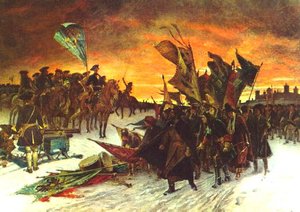Great Northern War
|
|
- Not to be confused with the Northern Wars (1655–1661)
Marten's_Poltava.jpg
The Great Northern War was the war fought between a coalition of Russia, Denmark-Norway and Saxony-Poland (from 1715 also Prussia and Hanover) on one side and Sweden on the other side from 1700 to 1721. It started by a coordinated attack on Sweden by the coalition in 1700, and ended 1721 with the conclusion of the Treaty of Nystad, and the Stockholm treaties. As a result of the war, Russia supplanted Sweden as the dominant Power on the Baltic Sea and became a major player in European politics.
Between 1560 and 1660, Sweden conquered a Baltic empire centered on the Gulf of Finland and comprising the provinces of Karelia, Ingria, Estonia, and Livonia. During the Thirty Years' War Sweden gained tracts in Germany as well, including Western Pomerania, Wismar, Bremen, and Verden. During the same period Sweden conquered Danish and some Norwegian provinces north of the Sound (1645; 1660). This stunning series of victories was generally due to the training of the army, which was far more professional than most continental armies, and could maintain much higher rates of fire due to constant training with their firearms. However, Sweden was unable to support and maintain her army when the war was prolonged and the costs of warfare could not be passed to occupied countries.
In 1617 Sweden's gains in the Treaty of Stolbovo had deprived Russia of direct access to the Baltic Sea, and internal strife during the first half much of the 1600s meant that they were never in a position to challenge Sweden for these gains. Russian fortunes reversed during the later half of the 17th century, notably with the rise to power of Peter the Great, who looked to address the earlier losses and re-establish a Baltic presence. In the late 1690s he allied himself with Denmark and Saxony-Poland, both of whom had also lost territory to Sweden, and in 1700 the three powers attacked.
The early part of the war consisted of a continual string of Swedish victories under Charles XII. Denmark was defeated in the summer of 1700 in what was to be the first major battle of the war, and so badly beaten that she could not participate in the war for a number of years. Russia was next, and suffered a crushing defeat in the Battle of Narva in November. The pace slowed when Charles turned his attention to the prince of Saxony and Poland, and it was not until 1706-1707 that he was able to finally defeat Augustus the Strong, who was temporarily deposed from the Polish throne.
During the years between 1700 and 1707, Peter had retaken Ingria and founded the city of St. Petersburg. He had started to build a navy and a modern-style army, based primarily on infantry drilled in the use of firearms. Charles invaded Russia again in 1708, but became frustrated in Smolensk and headed to Ukraine for the winter. However, the abilities of his force was sapped by the cold weather and Peter's use of scorched earth tactics. When the campaign started again in the spring of 1709, 1/3rd of his force had been lost, and he was badly defeated by Peter in the Battle of Poltava, fleeing to the Ottoman Empire and spending five years in exile.
This shattering defeat did not end the war, although it decided it. Denmark and Saxony joined to the war again and Augustus the Strong regained the Polish throne. Peter continued his campaigns in the Baltics, and eventually he built up a powerful navy. In 1714, Peter's galley navy managed to capture a small detachment of the Swedish navy in the first Russian naval victory near Hangö udde (Gangut in Russian).
Though Charles returned from the Ottoman Empire and resumed personal control of the war effort, he had little time to accomplish anything before his death in 1718. Over the next few years little changed, but a series of raids on Sweden itself demonstrated that there was little fight left, and soon Prussia and Hanover entered the war in the hope of gaining territory when peace was made. Eventually a series of massive seaborne invasions by combined Danish and Russian navies of the Swedish homeland forced the issue.
The war was finally concluded in 1721. Sweden had lost almost all of her "overseas" holdings gained in the 17th century, and was no longer a major power. Russia gained her Baltic territories, and from then on was the major power in the east.
See also
Template:Commons Extensive information on the major battles and campaigns of the Great Northern War can be found as part of these articles:
- Peter I of Russia
- Charles XII of Sweden
- Battle of Narva
- Battle of Poltava
- Battle of Lesnaya
- Treaty of Nystad
- List of Swedish wars
External link
- Great Northern War Timeline (http://www.timelines.info/history/conflict_and_war/18th_&_19th_century_conflicts/great_northern_war/)
da:Den store nordiske krig de:Großer Nordischer Krieg et:Põhjasõda fr:guerre du nord hr:Veliki sjeverni rat it:Seconda guerra del Nord nl:Grote Noordse Oorlog ja:北方戦争 pl:III wojna północna ru:Северная война fi:Suuri Pohjan sota sv:Stora nordiska kriget he:מלחמת הצפון הגדולה

